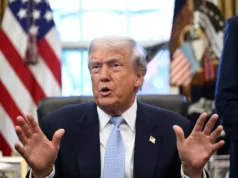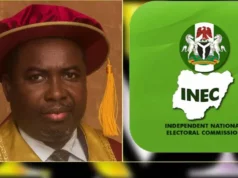Shina Phillips, the CEO of Matchmakers Consult International Limited, is known to many as one of the pioneers of modern day Nollywood and a versatile FIFA-Licensed Players’ Agent. He is the initiator of the prestigious Nigeria Pitch Awards and an FRSC Celebrity Marshall; not many however know him as a seasoned security expert known for his professional and in-depth knowledge of security issues. His involvement in security dates back to the late 1990s. He is a regular face on Security Watch Africa Programme on the Africa Independent Television (AIT). He has served as an International Assessor for ‘Security Watch Africa’ and ‘Security Watch Africa Awards’. He has had the privilege of having to go round the country to do assessments on the state of Nigerian security; to proffer advice, where necessary, to the government; and commend the security agencies where they are doing well. In an interview, he dissects Nigeria’s security problems and what needs to be done to get us out of our security woes.
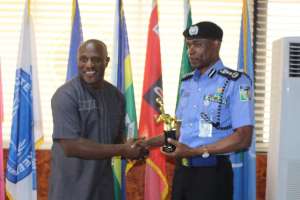
Nigeria’s State of Security: We need to step up spending on security
While assessing the state of Nigeria’s security, Philips believes that the Buhari’s administration, just like his predecessors, has budgeted and spent huge amount of funds on security. “Since assuming office as President and Commander-in-Chief, the President has approved huge budgetary spending on security and generally, people could see the impact of this on the battle against the Boko Haram insurgency in the North East. We have also had the military getting involved more and more in internal security as a stop-gap approach to curtailing growing incidences of insecurity around the country. The President has ordered recruitment of more security personnel especially in the Nigeria Police, in order to improve police presence around the country. The media have also reported the military taking delivery of military hardware and weapons necessary to fight not just the insurgency in the North-East but other battle fronts around the country. These are very commendable steps. No doubt, Nigeria is making steady gains in security.
“In spite of these spending, you cannot dismiss the fact that certain security agencies, especially the Nigeria Police, are indeed underfunded. Let me fist put this in the proper context: in any country in the world, no amount spends on security will ever be enough, even in America. In Nigeria, we need to further step up spending on security to adequately tackle our security situation. At this level, as the greatest black nation in the world, our Police especially are not as technologically equipped as the Police in more advanced nations. It is saddening. I have had the privilege of being out there and I can tell you that their Police are well-kitted and well-funded; let alone the military and some other arms of their security agencies. I think that with the kind of awareness now in our society, there is need for proper funding of not just the military but also of the Nigeria Police because they are responsible for internal security. When you look at the situation of things today, I do not see any difficulty or any form of complexity in tackling the security problem we have in this country because we have what it takes.’
“Secondly, when I look at our own setup, the major problem I see is that we have not successfully managed our diversity: we are divided across religious lines; we are divided across ethnic lines and sometimes we are sharply divided across certain ideological and political stands.”
Speaking further, Philips highlights the massive impact a nation’s economy plays in maintaining security. “There is no amount of expertise you deploy to deal with the security of a nation without looking at the economy of that nation. We must pay attention to those things that easily trigger some of the criminalities you have in our society. Suffice to say that in Nigeria, we have a lot of security experts who have proffered solutions by way of security expertise but then they seem to fail because you need to first create an enabling environment that is safe for investments and safe for creation of jobs. I think the President and his cabinet realized at some point during his first tenure and that was why we experienced spirited efforts to inject funds into the economy through the ‘Tradermoni’ initiative which is a form of cash transfer to people who may not be able to access business loans from banks. It is a good idea because in spite of the criticisms, it has seen billions of naira in circulation and more importantly, in the hands of those who really need it.”
Explaining further, Philips provides a rear insight into the futility of any government’s efforts at securing the society without paying proportional attention to growing the economy. “If you provide security in a particular environment and neglect issues of job creation and economic and social welfare of the citizens in that same environment, you are inevitably and invariably going to have an upsurge in criminality that will equally put a lot of weight on your security apparatus.”
Making the point clearer, Phillips states; “the more security agencies try to tackle criminality on this side, the more it increases on the other side so much so that there is strong likelihood that these efforts will yield little or no result.”
Tackling poverty, trans-border arms’ flow with reduce insecurity
Shina Philips believes only a well-thought out and holistic approach to the nation’s security challenges will yield desired results. “Unfortunately for our security chiefs, one of the first things to do is outside their statutory responsibility. The economy must take centre stage in finding solution to insecurity in Nigeria. Some criminalities such as cultism, armed robbery, burglary, banditry, kidnapping and so on, can be linked to the fact that there is no daily supply of meal in many homes. While poverty is not entirely responsible for crimes, a high rate of poverty will most likely trigger a corresponding high rate of crime. So I would think that no matter the design you put in to deal with criminality in the country, it is also safer to look at the economic wellbeing of the people. I think this alone will reduce the level of criminality and boost the efforts of the security agencies. I see this government is working on this and I encourage them to make more haste. I also advise the government to look into the idea of the Social Security Scheme especially as practiced in most advanced societies. This will take care of the vulnerable citizens and ensure that the society caters for them on a regular basis.”
“Secondly, our security arrangements must continue to evolve in order to confront the new face of crime on the continent. One of the ills of globalization is the issue of trans-border crimes. We know the President has reached out to leadership in neighbouring countries, but more has to be done to stop the inflow of arms and devices and even criminal elements across our borders. On the one hand, we are dealing with the issue of Boko Haram, whose threat the military have been able to bring down to a certain level. I would say the only thing left now is to completely annihilate the sect, but technically and to a very large extent, that has been dealt with. On the other hand, we are also dealing with several other security threats across the 6 geo-political zones: armed banditry, kidnapping, armed robbery, cultism and gang related conflicts, militant and succession agitation. We have special security task forces operated by the Nigerian Army, Navy, Airforce, Department of State Services, EFCC, NSCDC and others. It is not enough to say we are equipping the security agencies with weapons or that we are looking at the area of intelligence gathering, or that we looking at funding the agencies as it were; there will always be the very salient issue of coordination, collaboration and cooperation among the security agencies. Competition and rivalry among them will only serve narrow and parochial interests.
“We can then look at the internal security architecture where the Nigeria Police play a major role. What do we need to do to be able to manage our internal security in the country and deal with insecurity?” Philips asks rhetorically.
We need database and predictive policing
Predictive Policing is premised on the availability of data which will help the police predict venue, time and possibly persons involved in criminalities based on a particular trend observed through a study of data. For instance, take the issue of kidnapping: If the police are technologically equipped, they will be able to track and eventually arrest perpetrators of kidnapping. We need the police to set up a strong central database where they can access records of criminals who have in the past committed any crime. There seems to be a strong loose end as far as that area is concerned. Data is of central importance to the success of the Police. This will make us have an appropriate budget for our security agencies to deal with the issue of criminality.
“There are currently plans to add 280, 000 officers to take the strength of the Nigeria Police to 650, 000 officers. At the current strength of 371, 800 police men and women, the country has a ratio of 1 police man to 467 citizens. This is grossly inadequate. In some countries the police-citizen ratio is just one to ten or twenty.’
IGP Adamu is competent, savvy with technology for 21st century policing
Shina Phillips’s position and disposition on the current Police leadership has been well documented in the media. Having interacted with the Police hierarchy over the last decade, he is perhaps best suited to speak on how well prepared the Police leadership is to tackle insecurity in Nigeria. “I will say that the Nigeria Police are fortunate to have as IGP, Abubakar Mohammed Adamu, a highly seasoned police officer, with a strong management team and officers that are responsive and ready to run with his own vision and who are ready to take the Nigeria Police to its enviable height. We have an Inspector General of Police who understands what global policing is; what is obtainable in term of policing all over the world. When you have such a person as the IGP, there is a likelihood and definitely so that there will be a huge turnaround. He will be able, not only to generate the funds that the Police need, but also to technologically equip the Police.’
“The best way to assess the readiness of the Police is to first assess its leadership. As I said and I wish to be quoted out there, fortunately for the Nigeria Police, the current IGP knows what to do in the area of technological advancement, sourcing for funds and partnering with the government to give Nigeria the kind of Police they can be proud of. He also knows how to rid the Nigeria Police Force of elements that have dented the image of the Nigeria Police.”
Explaining his position further, Phillips takes a look at the number and caliber of those serving with him; they are the ‘Progressives’ of the Force. “If you step into some of their offices: the DIGs, AIGs and CPs, you would be very proud of our Police. So we have a leader who has those running with his vision and I know, giving him time and government backing he will be able to equip the Nigeria Police so honourably that the perception of the public about the Police will change and there will be room for collaboration. He has the knowledge of what Community Policing is; he has knowledge of what visibility in terms of police presence without unnecessary harassment is. Also, I have keenly observed that this IGP knows what the right of the Police officer is and what the right of the citizen is. Our hearts should bleed when we hear that a police man or woman is killed in the line of duty.
“The IGP is also working to enhance institutional capacities and prime all police departments. There is going to be tremendous change. I know him and I know he is not carried away by the office. He has enmeshed himself in the vision of the Nigeria Police. He is assisted by the entire management team of the Nigeria Police who are determined to run with his vision. He is supported by a professional and irrepressible image maker in DCP Frank Mba, a very effective ACP Idowu Owohunwa, the Principal Staff Officer to the IGP, SP Jolugbo Moses, a seasoned international police officer and a dedicated secretariat made up of Special Assistants and Personal Assistants ever ready to serve the IGP. I expect nothing less than an efficient and vibrant Police Force while these men and officers remain in charge.”
President Buhari should give more support to Police
“This will be the president’s legacy because he has an able lieutenant in this IGP, whose vision for the Police tallies with the President’s. If there is a political will and proper funding, believe you me, criminality will be dealt with and as the most populous black nation in the world, we would take our proper place in the comity of nations and stand proudly.”
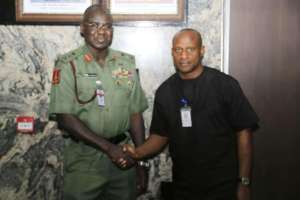
Outlining some of the immediate benefits of a secured Nigeria, Philips identifies tourism as one area the nation will experience improvement. “The sector will attract more investors and more tourists from abroad. This will boost our revenue and trigger more FDI inflows. No investor will come to a country where there is no security. If there is good security, you will see that the Nigerian economy will grow and can run 24 hours. Nigeria has everything it takes to run a 24-hour economy. ”
My Position on Community Policing
“Community Policing is not strange to us. In fact, effective policing is partnership with the community. However, there is need to sensitize the people and partner with the traditional rulers; bring them into the entire security architecture in order to make them understand the place of partnership. Community Policing takes the saying that ‘The Police is your friend’ into the realms of reality. It builds trust between the Police and the community. The Police basically need information to perform maximally. The community can provide the needed information but the Police must guarantee the security and continuous safety of informants by keeping them anonymous. There is also the need to create what is called ‘constabularies’ so that within an environment, we can look at men and women of honour who people in the society can vouch for; build them into the Force and give them privileges to act as eyes for the Police. The only limitation for them is that they cannot carry weapons. These people, by virtue of their being members of a particular environment, will have access to information which will help the Police fight crime and keep society safe.’
State Police may polarise ethnicity, except…
The issue of State Police has been in our national discourse since Nigeria returned to democratic rule in 1999. However, in recent times, owing to grave security concerns across the country, the calls for the adoption of State Police have increased. As an International Assessor on security, Shina Philips states what his position and elaborates on factors which influenced his decision.
“I have been strongly concerned about the idea of State Police. Before we can heed calls for State Police, we have to beef up the federal police structure and operation and get it well-funded. If the structure of our police is perfected at the federal level and patriotism has become the order of the day, then the idea of State Police will be embraced by all.
“My position is informed by the very obvious fact that State Police in Nigeria today may be abused not only by politicians as some people have said but by the ordinary citizens especially if rules of engagement are not properly defined. Our problem as a nation is hinged on patriotism. For state police to work the people must be very patriotic and for us to rid the nation of corruption, we must be patriotic. ‘
“Patriotism is the way forward for Nigeria and Nigerians. When you see a nation whose people are patriotic, you will see the flag of that country proudly displayed everywhere regardless of differences in tribe and religion. Religion cannot unite a nation because you have different creeds; but patriotism can unite the people regardless of their religious, their ethnicity, their political differences because at the end of the day, you are thinking alike and placing the nation above yourself. Unfortunately, the leaders we have today are thinking of themselves above the nation. They have selfish and greedy tendencies and they so ignorantly display it. But when you become patriotic, the common interest of the country is paramount; you are thinking, at that point, what you will do for your country and not what your country will do for you. But the country also must be able to stand tall so that its people will be proud. This is when the country needs to create such an environment where it has done greatly for its people in the areas of infrastructure and the economy.’
“I am aware that proponents of State Police have argued that when the system is adopted, police officers will be men and women who know the environment and the terrain well and will also know the people very well. But this is my argument against this line of thinking: If a Hausa man who comes from Maiduguri and resides somewhere in the South-South, has a case against an indigene of one of the states in the South-South; the IPO is from the South-South. The DPO is from the South-South. I can bet the first thing the South-South man will do is to speak in his dialect. It is the same thing if the situation is reversed. This means we are further polarizing the country and working against our unity.’
“We must first see ourselves as Nigerians before we begin to talk of our ethnic backgrounds, but the reverse is the case today. We should be able to see a Yoruba man introducing himself first as a Nigerian, an Ibo man and Hausa man introducing themselves first as Nigerians and it will be so much later that the other person will ask ‘What part of Nigeria are you from?’ We need to first think Nigeria.
“How do we achieve this? We need a leader who is visionary, patriotic and charismatic and fortunately we have that in President Muhammadu Buhari. He is leader with a whole lot of goodwill and massive followership. I will advise that the President convene a Confab solely for the purpose of instilling the noble idea of patriotism and galvanizing the population towards this direction. Remember that President Buhari as Military Head of State in 1984 did this. In Rwanda, for example, it took a visionary leader. It is so amazing that when you get a visionary leader, you will find people of like minds around him. A visionary leader is not keen on his cronies. A visionary leader is looking for those who will deliver. He will spell out the vision. He will find men and women who will die for that vision and you will find a people that will follow and die for the vision. These are visions that have taken the countries that we envy today to the height they are, and they have continued to sustain these visions. Americans are planning another trip to the moon. When JF Kennedy announced that America would be going to the moon, it took another nine years before they eventually landed on the moon! I must confess, it takes vision to do this. It is time for Africa to attempt the impossible and Nigeria can take the lead.
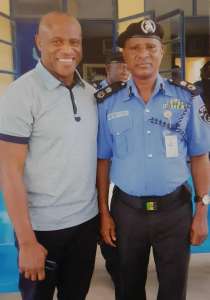
“Africa is a blessed continent. Africa’s sons and daughters have their footprints in great and timeless innovations across the world. This is why Matchmakers Consult International introduced the Africa LAMPS Awards. This represents Legends of Arts, Management, Politics, Science, Sports and Security Awards. It will identify and honour Africans who have made tremendous contributions to all human endeavours across the continents in the globe. I work with a crack team made up of Nelson Olafisoye, a versatile manager of resources, Fred Efole, a seasoned journalist and Ross Alabo-George and astute and experienced project manager.
Operation Puff Ader, POCACOV, are good initiatives
“The IGP Mohammed Adamu is a man of impeccable character. He has to a large extent shown himself to be patriotic and a visionary; he is a man who knows exactly what is best for the nation in terms of policing. He is a man who deals with people with patience so he can translate his vision to those who are working with him. If we have that kind of a leader as the head of our police, the speed at which there will be transformation will be interesting. One of the things I see about him is that he is so detribalized. His wealth of experience as an international police officer who was with INTERPOL and rose to an enviable position will prove crucial for Nigeria. He has a whole lot of experience to bring to the Nigeria Police. He loves being a policeman. I was not surprised when ‘Operation Puff Adder’ popped up and not too long ago, he flagged off the POCACOV – Police Campaign Against Cultism and Other Vices. This is an extremely smart move by the Police to tackle the problem of cultism and gang related crimes through advocacy and persuasion. This will be to the delight of all parents and school authorities across the nation.
“POCACOV will be marshalled by Ebere Amaraizu, a Superintendent of Police and PPRO of the Enugu Command under the supervision of the FPRO, Frank Mba. SP Amaraizu is a Police Officer who has demonstrated his passion for a youth population free from cultism and drugs. He is the best man for the job. By putting POCACOV under the FPRO, the IGP has clearly demonstrated faith in the use of education and advocacy to stern the tide and spread of cultism. This is a sign of the good things to come.”
Culled from P.M News


